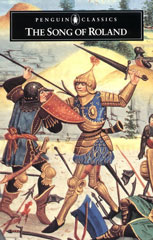 The Song of Roland
The Song of RolandClass: History 110- Medieval, Renaissance, and Reformation Europe
I thought I would include some reading I have done in class. This will most likely be the new habit come fall when I will have countless novels due, so I might as well get you used to the idea now.
Charlemagne is fighting the Saracens being led by Marsile in Spain. Charlemagne’s beloved nephew Roland has constantly fought valiantly by his side, but when Roland’s stepfather Ganelon commits an act of treason, Roland’s life is in danger. Marsile has offered a false peace pact in order to by the Saracens some time as Charlemagne’s troops return to France. Knowing Marsile has already killed two of Charlemagne’s messengers, Roland suggests his stepfather for the job to oversee this peace treaty. Ganelon has no choice to accept, but begins a plot to enact revenge on his stepson. Both Ganelon and Marsile wish to see the brave warrior dead for their own reasons and create a plan to cut off Roland’s troops in a mountain pass. It is taken out and Roland shortly finds himself in a heated battle with his best friend Oliver and a Bishop Turpin. Even though Roland is dealing blows with his sword Durendal that cut people in half, the French forces are still greatly outnumbered and losing. Roland’s pride will not let him call for help on Oliver’s request until it is too late.
The Song of Roland is an originally oral text that eventually made its way down into an English transition. The first time I read this was in French class senior year of high school while also re-enacting it. (Guess who was Roland!) Let me tell you, reading it in English is much better. The narration can get pretty repetitive, but the characters are all fantastic. The most interesting character has a very short scene. Aude, Roland’s betrothed and Oliver’s sister, when hearing of Roland’s death, falls dead on the spot. The interesting part about this piece has to do with when it was written down around 1090. At the time there was still a debate going on about valor and justice, etc. For example, you get the debate between Roland and Oliver, whether it is wiser and braver to fight to the death or to act wisely and call for help. Also, at Ganelon’s trial for treason some interesting questions about justice arise concerning what counts as treason and what legal punishment might only be revenge on Charlemagne’s part to Ganelon.
It’s definitely not going to be on the most recommended pieces of literature, but it is definitely a part of the canon for oral epics. The Song of Roland became an inspiration for Stephen King’s The Dark Tower series. It can’t be all that bad. If you end up picking up a copy and struggling with it (even though I don’t think you will), just be glad you are reading it in English and not in French like I had to.
“A truly great book should be read in youth, again in maturity and once more in old age, as a fine building should be seen by morning light, at noon and by moonlight.”
- Robertson Davies

No comments:
Post a Comment